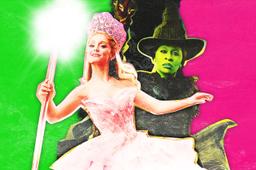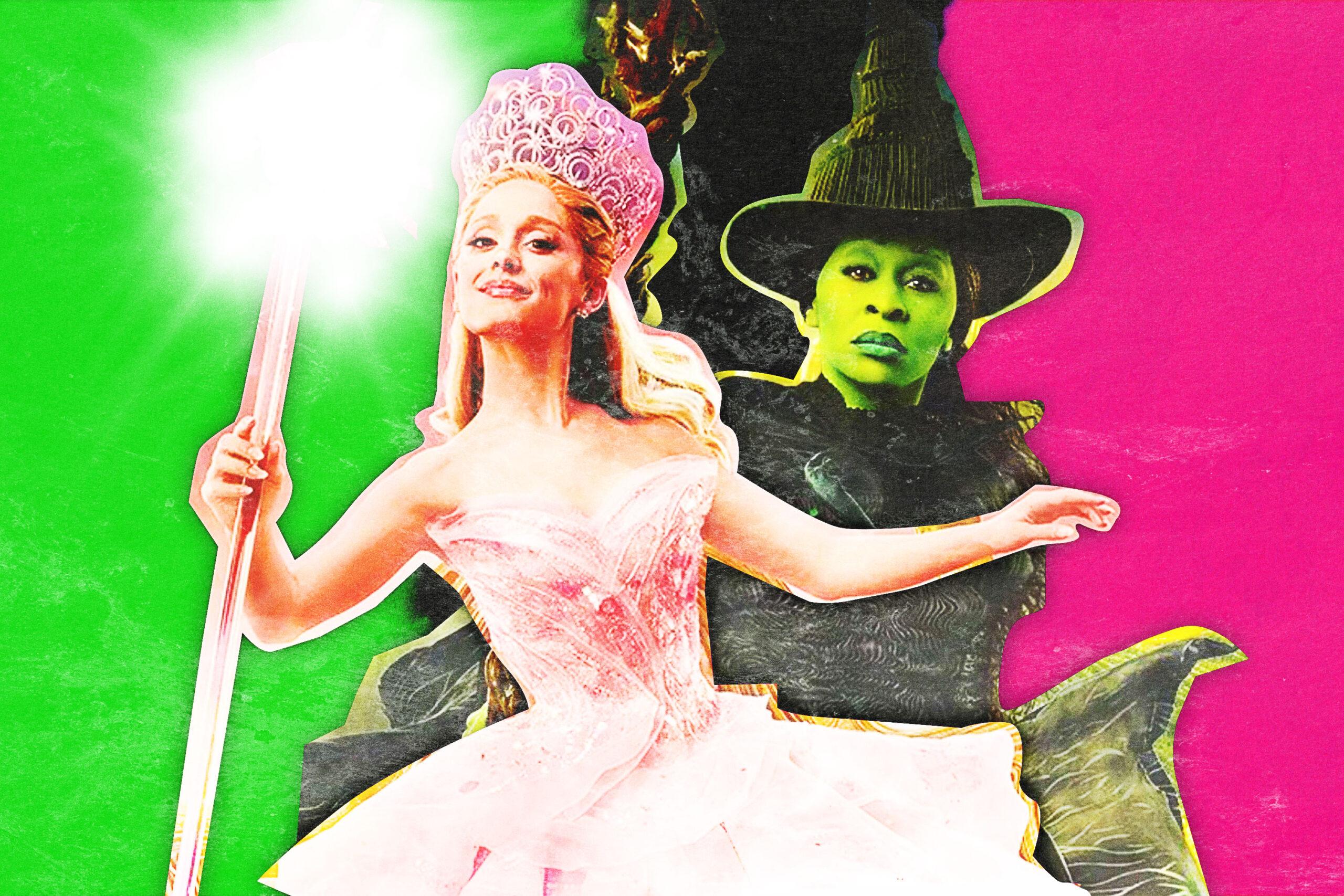When Wicked changed its much-anticipated release date for the second time, it was to avoid going head-to-head with Moana 2, which wound up hauling in $600 million worldwide at the time of this writing. Instead, Wicked moved ahead five days to duel with Gladiator II. It didn’t end up being much of a battle, certainly on a commercial level, but social media nonetheless attempted to hold space for #Glicked, the Paul Mescal–approved portmanteau of Wicked and Gladiator, in an attempt to recreate the box office magic of last year’s Barbenheimer.
Coined by Matt Neglia, editor in chief of Next Best Picture, Barbenheimer became a phenomenon that celebrated two eagerly awaited movies releasing on the same day. Whereas previously the emphasis might have been on competition, studios—or at least the cast, crew, and moviegoers—leaned into the grassroots partnership, which was much needed on the heels of the pandemic’s decimation of theaters and Hollywood’s dual writers and actors strikes. It paid off: Barbie’s total worldwide box office was more than $1.4 billion, making it 2023’s highest-grossing film and the highest-grossing film ever made by a female director. Oppenheimer made $976 million globally, coming in as the year’s third-highest-grossing film, after The Super Mario Bros. Movie.
One has to wonder whether the comparatively somber Oppenheimer would have gained so much traction if it weren’t riding Barbie’s limited-edition Midnight Tuxedo coattails all the way to the box office. After all, she is the most famous doll there is, and many women, girls, and femmes in the Western world over the past 60 years owned one, fantasized about owning one, or were otherwise preoccupied by how she made them feel. J. Robert Oppenheimer is a compelling subject and Christopher Nolan has proven to be one of Hollywood’s most bankable directors, but even that level of success was a shock to many in the industry.
In the case of Barbie, its success wasn’t just about its preestablished name recognition. The film’s marketing was inescapable for months last year. The movie had collabs with all manner of brands, from Burger King to Hismile Toothpaste to Ruggable floor coverings. The international press tour lasted for what seemed like weeks on end and spawned numerous headlines about the cast’s red carpet looks. There was even a Ken’s Mojo Dojo Casa House Airbnb! Meanwhile, people on social media marveled at how little promotion Oppenheimer received, the film instead seemingly coasting on its association with the women’s labor surrounding Barbie.
It seems like this was a branding strategy Paramount cottoned on to for Gladiator II’s shared release date with Wicked. Cynthia Erivo and Ariana Grande emptied their tear ducts in interview after interview, going viral many times over in the process. Meanwhile, the only real excitement we got from the Gladiator II press tour was a deleted gay kiss and Mescal’s late-stage SNL appearance. (Paramount representatives declined to provide comment for this article.)
Unfortunately for Gladiator II, “replicating that kind of [Barbenheimer] phenomenon is difficult,” says Charlotte Mair, managing director of marketing and brand strategy firm the Fitting Room, which has worked with clients such as Idris Elba, Meta and Instagram, and Popeyes. “Glicked just doesn’t have that same organic wow factor. It was good once, but twice was a flop.”
Whatever you think of Wicked’s marketing blitz, it certainly followed the Barbie playbook; its studio, Universal, partnered with everything from luxury and food brands to clothing lines and released an ill-fated Mattel doll range pointing consumers to a porn site on its boxes. (Representatives from Universal did not return a request for comment on this article at press time.)
Barbie topped Oppenheimer’s worldwide takings by nearly 40 percent, and Wicked, too, has blown Gladiator II out of the shark-infested waters that flooded the Colosseum (sure): Wicked has grossed $91 million more than Ridley Scott’s sequel. It helps that Wicked is the superior film and a surprise Best Picture front-runner, but it also had a built-in audience that showed up for the adaptation of the fourth-longest-running Broadway musical in history.
“Barbie and Wicked were able to tap into preestablished fan bases such as theater kids, young girls, and nostalgic audiences, which made their marketing campaigns more focused, fun, witty, effective, and feel more natural,” Mair says. “These films also incorporated themes of empowerment, feminism, body positivity, diversity, and nostalgia, which generated deeper social conversations.”
However, Mair adds, movies like Oppenheimer and Gladiator II are still seen as “universal” (read: male, even though the driving story of Barbie was about Ken), whereas there’s a sense that women’s stories are niche and thus require complete saturation of the market or a cutesy hashtag to “trick” four-quadrant audiences. “Female-led films often face harder challenges of ‘needing’ to work harder to attract audiences, which in turn makes it harder to secure marketing budgets and funding,” Mair continues. In the case of Barbie, it’s clear that the film did not require any promotional support from Oppenheimer, so we can only hope that history won’t fold Barbie’s momentous achievements into the phenomenon of Barbenheimer as a whole.
“Barbie helped Oppenheimer more than Oppenheimer helped Barbie,” says Scott Mendelson, a box office analyst at Puck, “but they both mutually benefited and they both would have been solid hits in a vacuum.”
But could Wicked’s commercial superiority mean that we’re finally seeing women-led blockbusters stand on their own instead of sharing the glory with male-focused counterparts?
“This could still be seen as an exception,” Mair says. “Both Barbie and Wicked received a tremendous budget and other factors that could be seen as influences in their success, rather than female leads being the key factor. We need more consistent successes in the film industry to embrace the idea of women-led blockbusters standing on their own.”
Mendelson is more hopeful. Even though #Glicked didn’t quite land, he’s still heartened by the success of Moana 2, Wicked, and Gladiator II’: “It is far more important, impressive, and optimistic that these three films are all doing what I would argue are best-case-scenario numbers without having to become this weird, fluky, online meme. The movies themselves are enough.”




